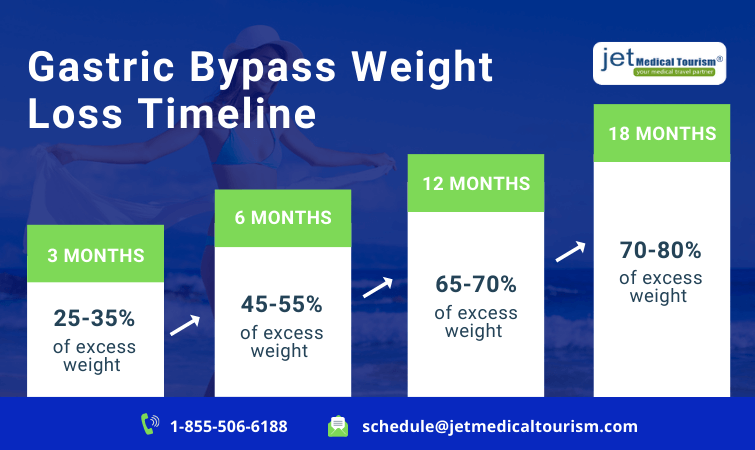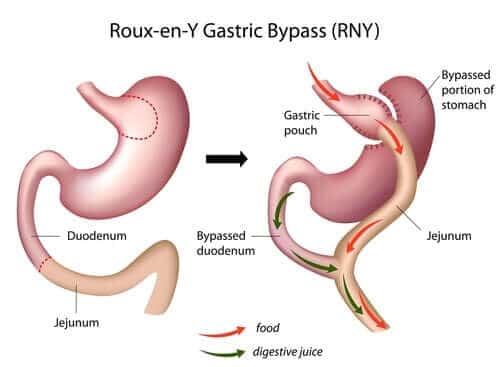Gastric Bypass Weight Loss Chart, Timeline 2025
Gastric bypass weight loss chart provides an estimate of the excess body weight you can expect to lose after the surgery. At the time of your initial consultation, your bariatric surgeon will explain to you how much weight in pounds you might lose at various post-operative stages. Surgeons are able to determine the gastric bypass weight loss timeline based on the data of past patients.
One of the advantages of gastric bypass surgery is that it is the original bariatric surgery that came into practice more than half a century ago. Therefore, an extensive amount of clinical data is available about the success rates, complication rates, and weight loss patterns after this surgery. Gastric bypass weight loss chart is a scientific way to understand the potential benefits of this surgery, and make an informed decision.
Wish to know about your estimated gastric bypass weight loss timeline? Talk to our bariatric surgeons at Jet Medical Tourism®. Book a consultation today!
Average weight loss with gastric bypass
The average gastric bypass weight loss is about 60 to 70 percent within one year after the surgery. You should be aware that “weight loss” for any bariatric surgery normally refers to the “excess” body weight that you should lose. In general, the ideal BMI (body mass index) is considered to be in the range of 18.5 to 24.9. BMI from 25 to 29.9 will be considered overweight, while BMI of 30 and above indicates obesity.
Therefore, if your ideal body weight is 150 pounds, but your actual weight is 290 pounds, it means your excess weight that you should shed off is 140 pounds. According to the standard gastric bypass weight loss chart, you can lose up to 70% of 140 pounds = 98 pounds within the first 12 months after surgery. If you diligently follow your dietary guidelines, you may achieve your ideal body weight of 150 pounds at 18 to 24 months.
Related: Gastric bypass requirements: Am I a good candidate for it?
Gastric bypass weight loss chart
Gastric bypass weight loss chart will indicate the progress you can make to eliminate obesity at periodic intervals post-surgery. However, it is important to understand a few things about your gastric bypass weight loss timeline in order to form realistic expectations. Feel free to ask questions from your bariatric surgeon during your pre-op consultation to gain complete clarity about your estimated weight loss over time.
Monitor progress and set benchmarks
The purpose of the gastric bypass surgery weight loss chart is help you monitor your individual progress as well as give yourself a benchmark target to lose weight. Each patient has a unique metabolism and specific health conditions. Therefore, individual gastric bypass results will vary. Do not feel concerned about minor deviations in your actual progress from the benchmarks because they are just average figures.
Variable rate of weight loss
The second important thing to understand your gastric bypass surgery weight loss timeline is that the rate of weight reduction will vary. In the first few weeks, you can expect rapid weight loss because you will begin with a liquid diet. People lose on average about 20 percent of their excess weight within the first 8 to 10 weeks. As your diet gradually normalizes, the rate of weight loss after gastric bypass will also progressively become lower.
Gastric bypass weight loss timeline
Gastric bypass weight loss timeline will show your estimated progress at different stages of your weight reduction journey. The timeline is an average indicator, but actual results can vary depending on several factors. While the skill of your bariatric surgeon and your obesity-related medical conditions can make a difference, the key influencing factor will be how seriously you adhere to your post-op diet plan.
| Time After Surgery | Expected Weight Loss (%) | Milestones |
|---|---|---|
| 1 Month | 10-15% of excess weight | Rapid weight loss starts, adjusting to a liquid/pureed diet |
| 3 Months | 25-35% of excess weight | Transitioning to soft foods, improved energy levels |
| 6 Months | 45-55% of excess weight | Significant health improvements, noticeable body transformation |
| 12 Months | 65-70% of excess weight | Most patients reach their goal weight |
| 18-24 Months | 70-80% of excess weight | Maintenance phase begins |

- First Milestone – 3 Months: Your gastric bypass weight loss chart will show you at three months, you can expect to lose excess weight of up to 30 to 40 pounds. On average, this much weight loss may be about 25 to 35 percent of your total excess weight.
- Second Milestone – 6 Months: While your rate of gastric bypass weight loss will slow down after three months, you can still continue to lose between one and two pounds a week on average. As a percentage of your total excess weight, you may lose up to 45 to 55 percent.
- Third Milestone – 12 Months: Many people are able to lose up to 65 to 70 percent of their excess weight by this time. But do not worry if you have not achieved this milestone as per your gastric bypass weight loss timeline. Continue to stay focused on a healthy diet and regular exercise.
- Fourth Milestone – 18 Months: Although the goal should be to achieve your ideal body weight by this time, but even if you have lost 70 to 80 percent of excess weight, it is an achievement. Your gastric bypass weight loss chart may indicate 80 to 90% excess weight loss in 18 to 24 months.
Expected weight loss after gastric bypass surgery
Expected weight loss after gastric bypass surgery has a direct correlation with your post-surgical commitment to diet and exercise. But before that, it is vital that your surgery should be accomplished successfully so that your appetite and eating capacity reduces. Make sure that you work with a competent bariatric surgeon with specific training and experience in performing gastric bypass procedures.
You can achieve your goals as per your gastric bypass weight loss chart when the skill of your operating surgeon is combined with your personal will and determination. Depending on your age and health, your surgeon may adjust your estimated gastric bypass weight loss timeline. But if all parameters are within normal range, your expected weight loss after gastric bypass surgery will be as per the standard timeline estimates.
Related: What is gastric bypass surgery?
Gastric bypass weight loss calculator
Gastric bypass weight loss calculator is an automated formula to compute how much weight reduction you can expect at what point during your journey. The inputs required for this formula are your pre-surgery body weight and height. It’s critical to understand that while two individuals may have different weight and height, the percentage of excess weight loss can be similar between them.

- Example 1: Mary’s pre-surgery body weight is 250 pounds, and her height is 5’ 4”. According to the gastric bypass weight loss calculator, Mary has excess body weight of about 104 pounds. If she loses two-thirds (66%) of her excess weight in 24 months, she will weigh about 180 pounds.
- Example 2: John’s pre-surgery body weight is 400 pounds, and his height is 6’ 2”. According to the gastric bypass weight loss calculator, John has excess body weight of about 205 pounds. If he loses two-thirds (66%) of his excess weight in 24 months, he will weigh about 265 pounds.
In both these examples, the patients lost an identical amount of excess weight in percentage terms. But in actual pounds, their total weight loss was different. Therefore, you should remember that your weight loss must be seen in relation to your height. Bariatric surgeons also consider other factors such as gender, age, and general health condition to prepare a customized gastric bypass weight loss chart for you.
Gastric bypass weight loss by month
Gastric bypass weight loss by month will help you understand the pace of your weight reduction during different intervals within the first year of your surgery. Average weight loss after gastric bypass per month will be about 5 to 6% of your excess weight. However, all of this weight loss will be distributed unevenly depending on your diet plan and how your body responds to it.
Average weight loss first month after gastric bypass
Average weight loss first month after gastric bypass will be about 20 pounds. Many patients are able to lose about 15 to 20 percent of their excess weight at 30 days. Your average weight loss per week after gastric bypass may be about 5 pounds in the first month. The pace of weight reduction is the highest during this period because you will be on a liquid diet initially to allow your digestive system to adapt to the surgical changes.
Weight loss after gastric bypass 3 months
Weight loss after gastric bypass 3 months will be in the range of 30 to 40 pounds of your excess weight. In percentage terms, you may expect to lose anywhere between 25 and 35 percent of your excess body weight at three months. Your gastric bypass weight loss timeline will specify the actual weight you should ideally lose by this time. The actual weight loss varies between patients depending on the unique BMI of each individual.
Average weight loss 6 months after gastric bypass
Average weight loss 6 months after gastric bypass may range between 45 and 55 percent of your excess weight. In other words, by this time you can expect to reach the midway mark on your journey to achieve your ideal body weight. From fourth to sixth month, the pace of weight reduction will be slower compared to the previous phase. However, if you are losing one to two pounds of excess weight per week at this time, it is an excellent result.
Slow weight loss after gastric bypass
Slow weight loss after gastric bypass may occur in some patients for a number of reasons as follows:
- Metabolic Issues: Each individual’s natural metabolic activity is unique, which will influence the pace of your weight loss to some extent.
- Surgical Issues: If your bariatric surgeon has not removed an adequate portion of your stomach, it may still have more capacity to store food.
- Dietary Issues: For some patients, it may be hard to stick rigidly to the recommended diet plan. This may contribute to slow weight loss after gastric bypass.
- Medical Issues: Your underlying health conditions may sometimes lead to a slower pace of weight loss. Your gastric bypass weight loss chart will account for it.
How to speed up weight loss after gastric bypass
You can speed up weight loss after gastric bypass by staying committed to your prescribed dietary and fitness instructions. While pre-op and post-op diet will play a vital role after your gastric bypass surgery, the importance of fitness exercises cannot be ignored. You should follow the exercise schedule and regimen as directed by your surgeon after proper recovery.
At the time of your initial consultation or post-surgery, you should ask your bariatric surgeon about how to speed up weight loss after gastric bypass. The hospital’s nutritionist, physical therapist and other staff will provide you the best guidelines for this. As long as you abide by these guidelines, you should achieve your weight loss goals in the shortest possible time.
How to maintain weight loss after gastric bypass surgery
To maintain weight loss after gastric bypass surgery, you can take several steps in consultation with your surgeon. These include:
- Balanced Diet: You can achieve your goals as per your gastric bypass weight loss timeline in the long run if you remain focused on a healthy and balanced diet.
- Regular Exercise: Gastric bypass surgery is not a magic bullet. It must be accompanied by a healthy diet and a regular exercise and fitness regimen to maintain long term weight loss.
- Periodic Follow-up: Whenever you notice that your progress is deviating significantly from your gastric bypass weight loss chart, you should consult with your surgeon.
When you are leaving the hospital post-procedure, talk to your surgeon about how to maintain weight loss after gastric bypass surgery? They will provide you some insightful tips and suggestions to help you achieve your goals.
Gastric bypass weight loss plateau
Gastric bypass weight loss plateau refers to a temporary phase when the progress in weight reduction almost comes to a halt. Minor periods of weight loss plateau may occur for any patient, but if it lasts for more than six to eight weeks, you need to take action. You may either consult with your bariatric surgeon or a nutritionist and fitness expert.
These professionals will make some adjustments to your ongoing diet and exercise plan in order to trigger your body back into weight loss mode. Sometimes your surgeon may detect a medical issue that has caused the gastric bypass weight loss plateau. They will try to resolve the underlying problem to enable you to move on with your gastric bypass weight loss timeline.
How to restart weight loss after gastric bypass
To restart your weight loss after gastric bypass, your nutritionist will re-evaluate your diet plan. They may make it more rigorous for some time, while adding nutrition supplements so that you do not suffer from any vitamin or mineral deficiency. You should remember that temporary stalling of your weight loss progress is normal, and it can easily be corrected.
The key thing is not to ignore the issue when the weight loss has reached a plateau, or you seem to be regaining weight. Make an objective review of your diet and exercise routine to see whether there are any gaps. Share your feedback frankly with your surgeon or dietitian. This will allow them to suggest the appropriate corrective measures about how to restart weight loss after gastric bypass.
No weight loss after gastric bypass surgery
No weight loss after gastric bypass surgery may occur in rare cases. It is important to have a thorough medical review done with your bariatric surgeon in this situation. Once your surgeon is able to determine the underlying cause of no weight loss after gastric bypass surgery, they will be able to recommend an appropriate course of action. Your options may include:
Revision Surgery: If the surgeon determines that your primary gastric bypass surgery was not performed correctly, they may recommend a revision gastric bypass. This will reduce your stomach size further and help to jumpstart your weight reduction according to the gastric bypass weight loss chart.
Dietary Changes: Sometimes the surgeon may conclude that your failure to follow the prescribed dietary guidelines resulted in no weight loss after gastric bypass. They may put you on a revised diet plan under professional supervision to help you lose weight as per the gastric bypass weight loss timeline.
Related: Why am I not losing weight after gastric sleeve surgery?
Excessive weight loss after gastric bypass
Excessive weight loss after gastric bypass may occur in some cases, which is not a good thing. You should know that the ultimate goal of bariatric surgery is to help you achieve your ideal body weight. If you lose an excessive amount of weight beyond your gastric bypass surgery weight loss chart, it will increase your health risks.
Being under-weight is as unhealthy as being over-weight. Therefore, excessive weight loss after gastric bypass is not something to rejoice over, but an issue to be corrected. Your surgeon or a professional weight loss diet expert will help you readjust your daily diet. This will enable you to lose weight scientifically in a safe and controlled manner.
Long term results of gastric bypass surgery
Long term results of gastric bypass surgery are two-fold. On one hand, you will lose excess body weight and achieve a healthy, fit, and attractive figure. On the other hand, the procedure will help you eliminate or diminish the symptoms of obesity-related illnesses. With these twin benefits, you can restore your healthy and active lifestyle and dramatically improve your quality of life.
The key to maintaining the long term results of gastric bypass surgery lies in following a balanced diet and pursuing a consistent fitness and exercise regimen. At the same time, continue to pay attention to your nutrition supplements so that you do not experience any deficiency of vital nutrients. Stay well-hydrated, avoid junk foods, sugary drinks and smoking, and keep fit to enjoy a long and healthy life after gastric bypass.

|

|

|
Related: Gastric bypass before and after pictures: Best photos
Gastric bypass results 2 years later
Gastric bypass 2 years later should result in a weight loss of 80 to 90 percent in many cases. In an ideal situation, you may be able to shed off 100 percent of your excess body weight at 24 months. Your success in your weight loss surgery will depend on numerous factors, most importantly your commitment to the recommended diet and exercise plan.
Gastric bypass 2 years later may also result in complete relief from certain obesity-related health conditions, such as type 2 diabetes, fatty liver disease, hypertension, and obstructive sleep apnea. In some cases, partial symptomatic relief may be obtained. Many patients are able to reduce their dependence on medications for diabetes at this stage.
 Gastric bypass 5 years later
Gastric bypass 5 years later
Your success with gastric bypass 5 years later will depend on how diligently you have maintained an active lifestyle and a healthy diet. Some people may regain a certain degree of excess weight once again by this time, but many others will continue to maintain their best weight loss results. Occurrence of any gastric bypass related complications is rare at this stage.
In an exceptional case, if you find that you have returned to obesity following gastric bypass 5 years later, you may consider a revision surgery. But before this step, your surgeon may recommend you to follow a rigorous diet and exercise plan so that you may eliminate obesity naturally. A revision gastric bypass may be the last resort if natural methods don’t work.
Gastric bypass 10 years later
People who are diligent about their health and body weight will continue to enjoy the results of gastric bypass 10 years later. You should remain focused on eating small portions of food and chewing your food slowly. Stay away from the temptation of alcoholic, carbonated and caffeinated beverages as far as possible. If you are a smoker, quit, or at least minimize smoking.
Gastric bypass 10 years later is also likely to show visible improvements in your personal and professional life. Your physical agility and mental alertness levels would be much higher, resulting in excellent professional performance. On a personal level, chances are that you may enjoy a happier and more satisfying relationship with your partner.
15 years after gastric bypass
Many people report that they are able to maintain their weight loss results successfully 15 years after gastric bypass. One of the advantages with this procedure is that a large amount of research data is available for the last 50 years. Gastric bypass was the original bariatric surgery, which has been around for many decades.
Researchers have been able to track the results of patients 15 years after gastric bypass. More than half of the people may be able to maintain at least 70 to 80 percent of their excess body weight even at this stage. However, the results can vary, depending on the actual age and general health condition of an individual.
Gastric bypass 20 years later
Gastric bypass 20 years later can continue to provide its weight loss benefits as long as you are maintaining a healthy and fit lifestyle. Although aging effects will influence your metabolism and your body weight may marginally increase, but obesity can be easily avoided. If you have followed a balanced diet over the years, your stomach would not have re-stretched.
However, it is important to take your nutrition supplements regularly even at this stage. Gastric bypass 20 years later can also cause complications or vitamin deficiencies if you stop taking supplements. Good health and fitness is a lifelong process, and your gastric bypass surgery should endow you with the ability to live a long and enriching life.
Scientific Studies on Gastric Bypass Weight Loss
1. Improvement in Obesity-Related Conditions
According to a Multicenter Study published on pubmed, 68.2% of patients achieved complete diabetes remission within the first five years following gastric bypass surgery.
2. Comparison with Other Bariatric Procedures
A study published by PubMed Central concluded that gastric bypass results in faster and more sustained weight loss compared to gastric banding.
Gastric bypass weight loss FAQs:
Millions of women and men struggle with obesity today. Many of them have common questions and concerns related to bariatric surgery. Here are a few useful gastric bypass weight loss FAQs which should help you make an informed decision.
1. How does gastric bypass cause weight loss?
Gastric bypass will in both restrictive and malabsorptive ways to help you achieve weight loss. It involves reduction of the stomach size as well as rerouting of intestines to minimize calorie absorption.
2. What is a typical weight loss after gastric bypass?
According to the standard gastric bypass weight loss chart, you may lose about 65 to 70% of your excess weight at 12 months and 90 to 100% of your excess weight at 24 months.
3. How much weight do you lose the first month after gastric bypass?
On average, you may lose about 15 to 20 percent of your excess body weight in the first month after gastric bypass surgery. Many patients lose about 15 to 20 pounds within the first month after the surgery.
4. How much weight does a person lose after gastric bypass?
You can easily lose 100% of your excess body weight after gastric bypass. But maintaining this ideal condition will depend on your long-term adherence to your recommended diet plan.
5. Why do gastric bypass patients lose weight so fast?
Patients lose weight rapidly after gastric bypass because it not only reduces your stomach size to curb appetite, but also reduces your body’s ability to absorb calories.
6. How much weight do you lose 2 months after gastric bypass?
You can lose about 20 to 25 percent of your excess weight 2 months after gastric bypass on average. For example, if your excess body weight is 100 pounds, you can lose about 20 to 25 pounds at 8 weeks.
7. How much weight should I lose 3 months after gastric bypass?
You can lose about 30 to 35 percent of your excess weight 3 months after gastric bypass on average. For example, if your excess body weight is 100 pounds, you can lose about 30 to 35 pounds at three months.
8. How long after gastric bypass do you start losing weight?
You will start losing excess weight almost immediately after your gastric bypass surgery. In the first few weeks, you will be on a liquid post-op diet, which will enable rapid weight loss.
9. Is it possible to not lose weight after gastric bypass?
In rare cases, it is possible to not lose weight after gastric bypass. This could happen if your surgeon has not performed the procedure correctly, or you have failed to follow their post-operative dietary guidelines.
10. How to jump start weight loss after gastric bypass?
If your weight loss after gastric bypass has slowed or reached a plateau, you can jump start it with adjustments to your diet plan. Your dietitian can help you return to your normal gastric bypass weight loss timeline.
11. How fast is weight loss after gastric bypass?
Weight loss after gastric bypass is fastest in the first month. You will continue to lose weight rapidly in the first three months. Thereafter, the speed will be progressively slower, but you will continue to lose weight.
Have more questions regarding gastric bypass weight loss? Contact Jet Medical Tourism®
Your life is precious, and you don’t deserve to struggle with obesity for a lifetime. Advancements in bariatric surgery have made it possible to eliminate obesity. Gastric bypass surgery is the gold standard in bariatric procedures, which can help restore your ideal body weight and health.
At Jet Medical Tourism®, the bariatric surgeons can prepare your customized gastric bypass weight loss chart. This will indicate to you how your weight loss journey will progress after the surgery. To learn more, call us today and we will schedule your free, no-obligation consultation with one of our best bariatric surgeons!





